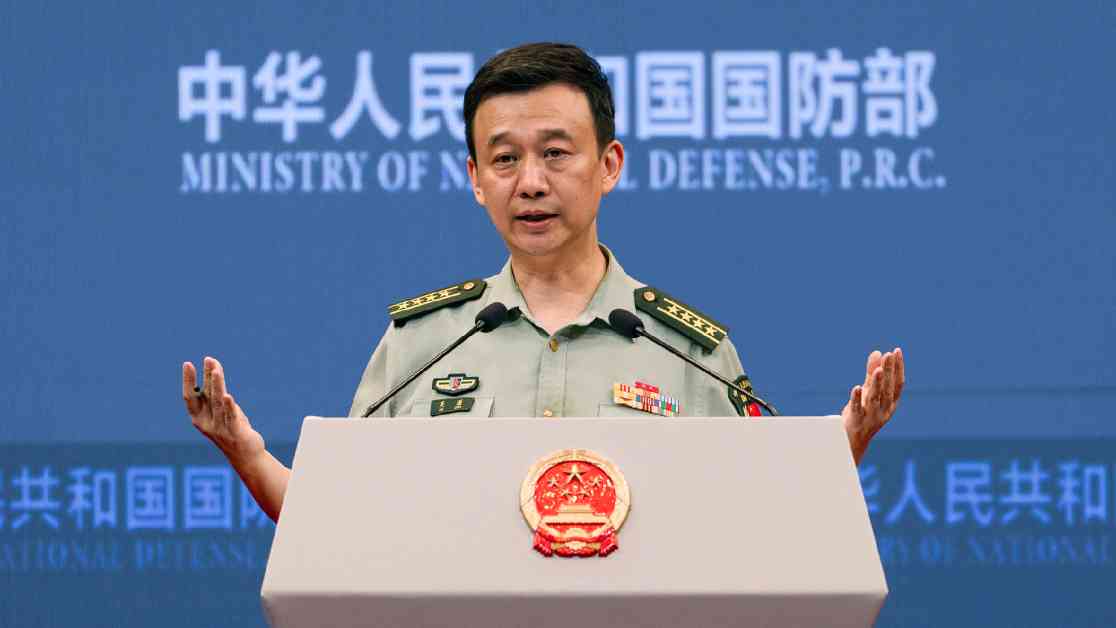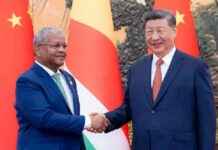China Urges Philippines to Remove Vessel from Xianbin Jiao: International Dispute Escalates
In a recent development that has heightened tensions in the South China Sea, China has called on the Philippines to immediately remove its coast guard vessel from the adjacent waters of Xianbin Jiao, a disputed area in China’s Nansha Qundao. The Chinese Defense Ministry spokesperson, Wu Qian, reiterated China’s claim of indisputable sovereignty over the Nansha Qundao, including Xianbin Jiao, and the surrounding waters during a press conference.
Philippines’ Unlawful Presence at Xianbin Jiao
The current dispute stems from the presence of a Philippine Coast Guard vessel, MRRV-9701, which has been anchored at Xianbin Jiao since April. China has labeled this presence as unlawful and a serious infringement on its sovereignty, violating international law and the provisions of the Declaration on the Conduct of Parties in the South China Sea. The prolonged stay of the Philippine vessel at Xianbin Jiao has raised concerns about regional peace and stability, prompting China to lodge strong protests against the Philippines’ actions.
China’s Response and Call for Resolution
China has firmly opposed the Philippines’ establishment of a long-term presence at Xianbin Jiao, viewing it as a provocative move that escalates tensions in the region. Wu Qian emphasized that China is committed to resolving disputes through dialogue and consultation but warned that patience has its limits. He called on the Philippines to withdraw its vessel and personnel from Xianbin Jiao, restoring the area to its uninhabited and unoccupied status. China reiterated its determination to safeguard its territorial and maritime rights through firm and effective measures.
Since August 19, the Philippines has made multiple attempts to breach Xianbin Jiao, leading to dangerous encounters with Chinese law enforcement ships. Wu Qian highlighted the deliberate ramming of Chinese vessels by Philippine coast guard ships, which prompted China to respond in accordance with the law. China’s actions have been characterized as professional and within regulations, aimed at protecting its interests in the region.
US Role in the South China Sea Dispute
Wu Qian pointed to the United States as the main instigator of the situation in the South China Sea, accusing the US of being the greatest destroyer of peace and stability in the region. He asserted that US encouragement and support have emboldened the Philippines to provoke China repeatedly. The US’s reliance on the Mutual Defense Treaty with the Philippines as a means of intimidating China was dismissed as futile by Wu Qian, who warned that such actions would only strengthen Chinese resolve and provoke greater indignation among the Chinese people.
The escalating tensions in the South China Sea reflect the complex geopolitical dynamics at play in the region. China’s assertion of sovereignty over disputed territories has drawn strong opposition from neighboring countries and the US, leading to a standoff that has the potential to disrupt regional stability. As the situation continues to unfold, the key challenge remains finding a diplomatic resolution that addresses the concerns of all parties involved.
Regional Implications and Calls for De-escalation
The prolonged presence of the Philippine coast guard vessel at Xianbin Jiao has raised concerns among regional countries about the potential for further escalation in the South China Sea. The Philippines’ actions have been seen as a provocative challenge to China’s territorial claims, prompting calls for de-escalation and dialogue to prevent a dangerous confrontation.
The South China Sea dispute has far-reaching implications for regional security and stability, with the potential to impact global trade and maritime routes. The involvement of external powers, such as the US, adds a layer of complexity to the situation, as competing interests and alliances come into play. As tensions continue to simmer in the region, the need for constructive engagement and peaceful resolution of disputes becomes increasingly urgent.
As China urges the Philippines to remove its vessel from Xianbin Jiao, the international community watches closely to see how this latest development will unfold. The stakes are high, and any miscalculation could have significant consequences for regional peace and stability. It is imperative that all parties involved exercise restraint and work towards a peaceful resolution that respects the rights and interests of all stakeholders in the South China Sea.









![Indie music fans gather at l’Antipode for [Face B] Kool Things soirée on Saturday night news-15112024-105933](https://shanghainewstv.com/wp-content/uploads/2024/11/news-15112024-105933-218x150.jpg)







